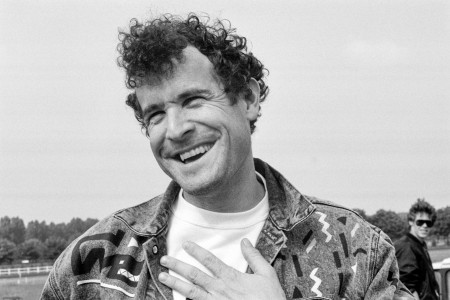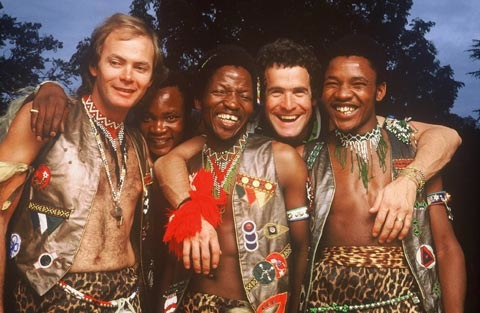Johnny Clegg

Jonathan Paul Clegg was born on 7th June 1953 in Bacup to a British father, Dennis Clegg, and a Zimbabwean mother, Muriel Clegg nee Braudo. Muriel came from a long line of Lithuanian Jewish immigrants and brought up Johnny as a secular Jew, refusing the bar mitzvah for him. On his parent’s divorce when he was an infant Johnny and his mother moved to Zimbabwe, to Israel, to Zambia where he attended a multi-racial school and then, when he was six years old to South Africa where he commented that he felt like a migrant. Johnny’s mother was a jazz singer and married a South African journalist who introduced the twelve year old Johnny to Zulu workers in the black townships. As these areas were segregated there were dangers in mixing with this group but he did it anyway and the experience had a significant effect on the young man.
Johnny’s adolescent years were spent soaking up this culture, in particular the music of the black suburbs of Johannesburg and under the teaching of Charlie Mzila, a cleaner by day and a musician by night, he learned the Zulu language as well as indigenous dance and guitar styles. Under apartheid these were perilous things to do and at the age of fifteen Johnny Clegg was arrested for trespass on government property and for violating congregation laws after curfew hours.
This didn’t stop him though, and at the age of seventeen in 1969 he met Sipho Mchunu, a migrant worker and gardener and along with the guitarist Charlie Mzila formed his first musical partnership, Juluka, (meaning ‘Sweat’) and with them performed Zulu songs and rhythms influenced by Celtic folk music. As a mixed race band, Juluka’s music could not be played by national broadcasters and Clegg and the band not only faced censorship from the government but risked imprisonment by appearing in clubs and other venues in South Africa. This band stayed together until 1986 when Mchunu chose to stop touring and take up cattle farming. At that point Clegg formed Savuka (which means ‘We have risen’) and recorded solo albums with this new mixed-race band.

During all of this time his music was recognised as important in the anti-apartheid movement with political Zulu and English lyrics intermixed, but this led to regular harassment and imprisonment of the band members and their concerts being broken up by the authorities. Wherever they were held, their performances were often disrupted as under apartheid legislation known as the Group Areas Act white people like Johnny Clegg were not permitted to enter segregated black townships without official permits and these were often withheld. Similarly, black people were kept out of whites-only areas by night-time curfews. Due to his political and cultural stance Clegg became known as the ‘white Zulu’ although he didn’t care for that name.
Eventually both of Clegg’s bands proved popular in the black and white communities, selling enough to win two platinum and five gold albums and touring the world with their inter-racial music and message. So popular were they that in Lyon they drew such a large crowd that Michael Jackson was forced to cancel his concert, claiming ‘they have stolen my fans !’
During a Savuka concert in Frankfurt in 1999 Johnny was joined onstage by Nelson Mandela who danced as Clegg sang ‘Asimbonanga’ the protest song Savuka had dedicated to him when Mandela was in jail. In the United Kingdom however, things were never good for Johnny. Because he had been expelled from the Musicians Union his band were barred from playing in June 1988 at the Wembley Stadium Mandela 70th Birthday Tribute. In 1990, Clegg was still politically and musically active, telling the New York Times that their mission was ‘to bring a whole collection of songs that are about the South African experience to the world.”
As if all of this wasn’t enough, Johnny Clegg had a second career as an Anthropology lecturer at both the Universities of Witwatersrand and Natal, writing a number of important papers on Zulu music. He would build his knowledge of culture and history into his stage act with Juluka and Savuka. His work was recognised in 2015 when he was made an OBE.
Clegg’s touring schedule was cut short in 2017 after undergoing critical surgery and in 2019 he died from pancreatic cancer having performed his last concert in Mauritius in October 2018. He was 66 years old. A statement by the South African government against whom he had struggled for most of his life captures his importance : ‘Mr. Clegg’s music had the ability to unite people across the races’ and that he had ‘made an indelible mark in the music industry and the hearts of the people.’ Born in Bacup, he became a national hero in South Africa by defying with joyful music and powerful language the evils of apartheid policies.